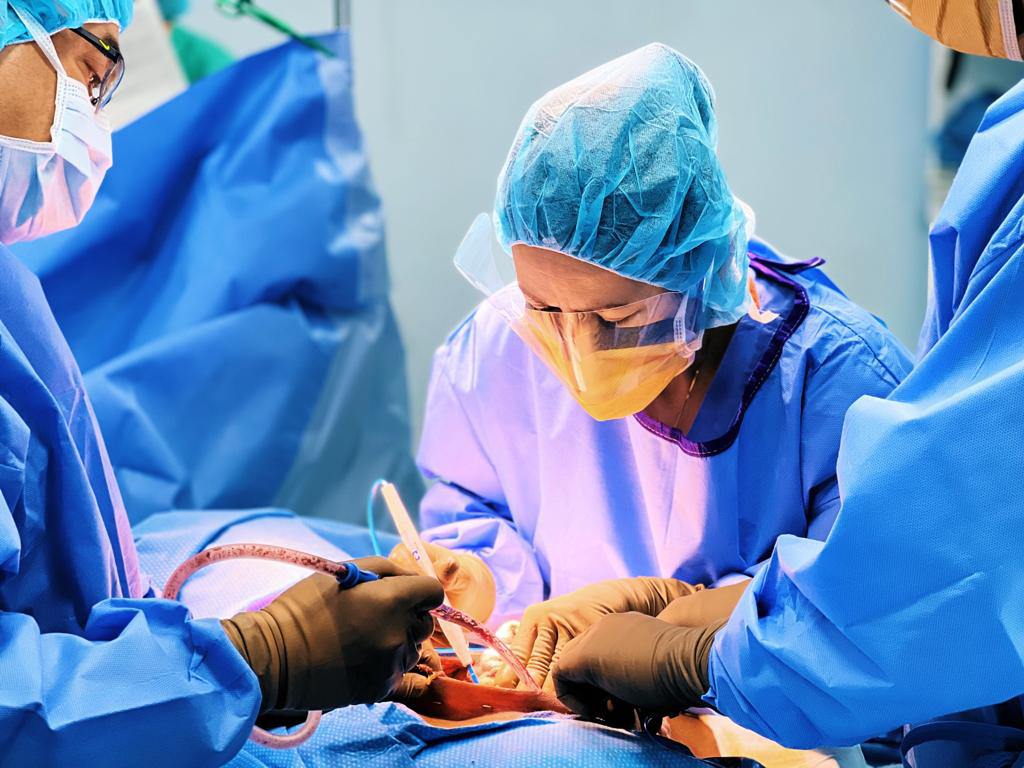
Most people are familiar with the international humanitarian medical nongovernmental organization Doctors Without Borders (Médicins Sans Frontières), started in France in 1971 in response to the war-torn devastation in Biafra.
Few, however, know that for the past 10 years, a particular and independent version of that mission, the nonprofit International Breast Cancer Surgical Mission, or IBCSM, has been operating out of Stony Brook Southampton Hospital, under the direction of Dr. Edna Kapenhas, the head of breast surgical oncology at the hospital and the director of the 13-year-old Ellen Hermanson Breast Center in Southampton.
Saturday, February 4, is the 23rd anniversary of World Cancer Day, and Kapenhas’s team of doctors, nurse practitioners, nurses, assistants and technicians will be preparing for a new visit to the Dominican Republic. They go each year to help close the gap in providing education about breast cancer and diagnosing and trying to manage the disease that World Health Organization data identify as “the most commonly occurring cancer,” with over 400 types to strike anyone, anywhere, anytime — including men.
While strides in diagnosing and treating breast cancer have been made in many Western countries, WHO continues to report the inequality of education and resources in low-income areas around the globe. Cancer rates are, predictably, relatively high in such areas, due to lack of awareness of early diagnosis and of access to treatment and resources.
Organizations such as Kapenhas’s persevere in trying to make a difference.
In February 2022, Kapenhas led a medical team of 12 volunteers, working on their vacation time, to the Dominican Republic, listed by WHO in 2020 as having 1,460 deaths resulting from breast cancer over the year, or 2.14 percent of total deaths in the country.
It was Kapenhas’s ninth trip there with the IBCSM, in conjunction with the nonprofit Island Impact Ministries, whose particular mission is to assist under-served populations in the Dominican Republic and Haiti.
Though the IBCSM trip last year got off to a rocky start when the group’s duffel bags full of medical supplies were inexplicably confiscated at the airport, the team of surgeons, radiologists, pathologists, anesthesiologists and nurses forked up money of their own to buy needed items and got to work.
Though the group was in the Dominican Republic for only one week, it delivered a wealth of services and information, treating patients with breast imaging, performing surgeries, demonstrating techniques for local staff, and most of all educating the population.
Before their arrival, Kapenhas notes, the population had been screened by a mammogram machine that was already there. Her group brings a sonogram machine “to further clarify any mammographic abnormality, as well as to perform sonographic guided biopsies.”
The Dominican Republic is one half of the island of Hispaniola, the most populous Caribbean island in the West Indies; the other half is Haiti, where it is impossible for IBCSM to extend its services, given concerns about safety. Kapenhas said she hopes that the situation will change, especially because Haiti had been included in visits along with the Dominican Republic when the missions began in conjunction with Island Impact Ministries.
Kapenhas first heard of the nonprofit organization through a colleague whose daughter had served with them. Kapenhas said she signed up, “always having wanted to start a medical mission.”
Kapenhas earned her medical degree from SUNY Buffalo, a city in the United States with a particularly strong record in researching and treating breast cancer.
To those who argue that she and her group should concentrate skills and resources on under-served populations in America, where one in eight U.S. women will develop invasive breast cancer over the course of her lifetime, Kapenhas is quick to answer for herself and her group: “As a breast surgical oncologist, I serve the under-served, under-insured, noninsured and undocumented populations here in the United States of America. To take these services to a [developing] country for one week out of the year does not change that.”
Does IBCSM bring change for the women of the Dominican Republic? Kapenhas is confident that the missions do make life better for patients and their families. “Every year we go back, our previous patients come to visit the team. It’s very gratifying to see how well they are doing.” Moreover, she points out, they refer their friends and families for treatment.
On Friday, February 10, Kapenhas and her team of dedicated volunteers will be at it again — this time, 24 strong.